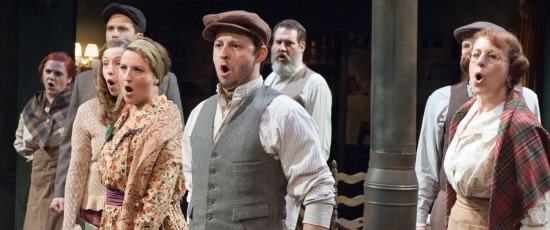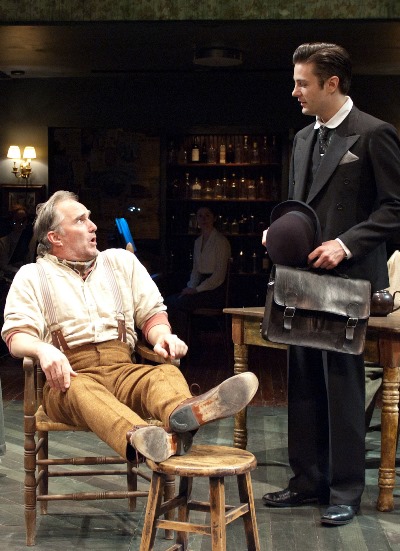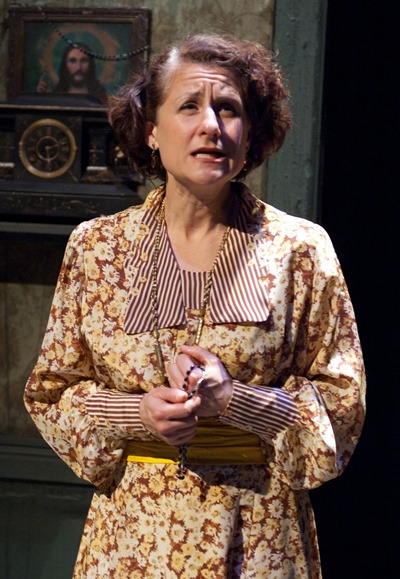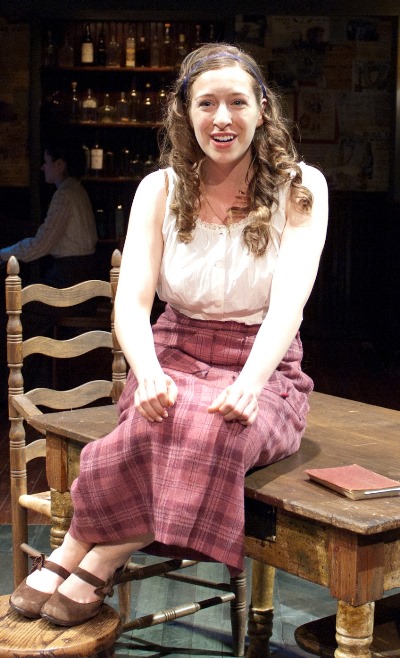‘Juno’ at TimeLine: Good effort can’t redeem Blitzstein’s tepid musical on O’Casey classic
 “Juno,” musical with music and lyrics by Marc Blitzstein, book by Joseph Stein, at TimeLine Theatre through July 27. ★
“Juno,” musical with music and lyrics by Marc Blitzstein, book by Joseph Stein, at TimeLine Theatre through July 27. ★
By Lawrence B. Johnson
Sean O’Casey’s colorful and enduringly popular play “Juno and the Paycock,” written in 1924, opens an intimate window onto both the violent political upheaval and the poverty that beset Ireland at that time. In 1959, the play now made into a musical titled “Juno,” with music and lyrics by Marc Blitzstein and book by Joseph Stein, opened on Broadway and promptly flopped.
 Despite occasional efforts to revive it, “Juno” has never captured the public’s imagination, and TimeLine Theatre’s current revival effectively demonstrates why. It isn’t a very good show; specifically, it suffers from a double whammy of unremarkable music and desperately inept versification.
Despite occasional efforts to revive it, “Juno” has never captured the public’s imagination, and TimeLine Theatre’s current revival effectively demonstrates why. It isn’t a very good show; specifically, it suffers from a double whammy of unremarkable music and desperately inept versification.
The musical follows the outline of the play: A poor Dublin couple, Juno Boyle (Marya Grandy) and her lazy, alcoholic husband Jack (Ron Rains), suddenly find themselves sitting pretty when they’re informed that a recently deceased relative has left Jack quite a tidy sum of money. While waiting for the cash to come through, they go on a spending spree for new furniture, new clothes, even a Victrola. Then comes the bad news, and more bad news, and sorrow begets sorrow.
Grandy and Rains are a well-matched pair, she the savvy and hard-working housewife and himself the splendidly self-important, work-fearing drunk. As the well-weathered Joxer Daly, James Houton provides a worthy drinking companion for good old Jack. While the singing is variable across the cast, Emily Glick brings a true voice to the Boyles’ romance-bound daughter Mary.
John Culbert’s mingled setting of tavern and home smooths the story-telling, and Alex Wren Meadows’ costumes catch the period nicely. Director Nick Bowling sustains a sense of narrative line, and the little accompanying band in the tavern makes an appealing contribution. But the bigger picture of this troubled musical is beyond the mortal means of music directors Doug Peck and Elizabeth Doran to repair.
 Sitting through one limp song after another, couplet upon couplet of pedestrian rhymes, I found my thoughts fleeing to the last several musicals I’ve seen from the hand of Stephen Sondheim, whose brilliant lyrics keep you leaning forward lest you miss a single witty syllable. For that matter, there is a plethora of Irish traditional songs better made than most of what Blitzstein mashed together in “Juno.”
Sitting through one limp song after another, couplet upon couplet of pedestrian rhymes, I found my thoughts fleeing to the last several musicals I’ve seen from the hand of Stephen Sondheim, whose brilliant lyrics keep you leaning forward lest you miss a single witty syllable. For that matter, there is a plethora of Irish traditional songs better made than most of what Blitzstein mashed together in “Juno.”
What’s really curious about the failure of Blitzstein’s effort is that it begins on such a promising high – with “We’re Alive,” a smartly crafted number for the company that captures a peculiarly Irish mix of despair and hope, to the effect that life has become just about intolerable, yet we’re still alive.
But from there it’s nearly all downhill, with the likes of an idiotic cant by a clutch of drunks lionizing a “Darlin’ Man” and an unrequited suitor’s insipid, numbingly repetitive appeal to the object of his love for “One Kind Word” – which later will be reprised!
 Of about the same quality are “Old Sayin’s,” a tedious chew of impoverished poetry meant to pass for familiar humor between Juno and Jack – and “Poor Thing,” a dreary quartet for four gossiping wives that suggests the conditioned routine and shared attitudes of folks who are getting through life largely by clinging to each other.
Of about the same quality are “Old Sayin’s,” a tedious chew of impoverished poetry meant to pass for familiar humor between Juno and Jack – and “Poor Thing,” a dreary quartet for four gossiping wives that suggests the conditioned routine and shared attitudes of folks who are getting through life largely by clinging to each other.
Consider, moreover, that the aforementioned numbers are not scattered lulls in an otherwise bright score but confront us consecutively and indeed form the musical heart of the first act.
The show actually becomes more interesting in Act II, as spoken dialogue increases to advance the plot. This is a good company of actors with a profoundly human story to tell, and when they essentially switch into drama mode, you forget you’re in a bad musical and connect readily with a collection of marvelous characters.
Related Link:
- Performance location, dates and times: Details at TheatreinChicago.com
Tags: Alex Wren Meadows, Doug Peck, Elizabeth Doran, Emily Glick, James Houton, John Culbert, Joseph Stein, Juno, Juno and the Paycock, Marc Blitzstein, Marya Grandy, Nick Bowling, Ron Rains, Sean O"Casey, TimeLine Theatre

